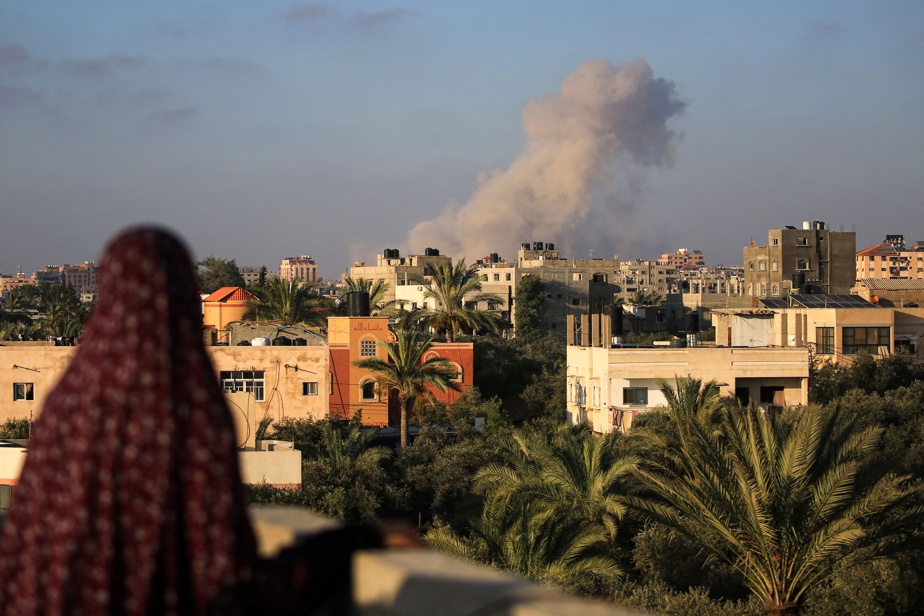(Doha) US Secretary of State Antony Blinken said Wednesday he was determined to push for a ceasefire in Gaza, expressing hope that differences between the Palestinian Islamist movement Hamas and Israel can be bridged, after eight months of war.
On the ground, deadly Israeli bombings continued to target several sectors of the besieged Palestinian territory, where a very serious humanitarian crisis is occurring.
“I hope there will be a ceasefire. We are destroyed. We want the terrible suffering we are enduring,” said Ahmed al-Roubi, a resident of the Bureij camp in the central Gaza Strip, a target of Israeli strikes.
Mr. Blinken completed his umpteenth tour of the Middle East since the start of the war between Israel and Hamas on October 7, in Qatar where the leader of the Islamist movement Ismail Haniyeh is based.
On Tuesday, Hamas announced that it had submitted to Qatari and Egyptian mediators its response to the plan announced on May 31 by US President Joe Biden, which provides for a ceasefire, as well as the release of hostages held in Gaza and Palestinians imprisoned by Israel.
The content of the response was not revealed.
Among Hamas’s demands, “some changes are achievable, some are not,” Blinken told reporters in Doha. “I think that gap can be bridged,” he added. “The longer this (war) goes on, the more people will suffer, and it’s time to stop the bargaining.”
In announcing the three-phase ceasefire plan, Mr. Biden presented it as an Israeli proposal.
But Prime Minister Benjamin Netanyahu says he will continue the war until the defeat of Hamas, whose unprecedented attack on Israel on October 7 sparked the war.
Hamas’ response sent to mediators contains “amendments” to the proposal announced by Joe Biden, “including a timetable for a permanent ceasefire and the total withdrawal of Israeli troops from the Gaza Strip”, according to a close source discussions.
Demands already formulated by the Palestinian movement and rejected by Israel.
Israeli media and the American site Axios claimed that Hamas had rejected the plan which provides, in a first phase, a six-week ceasefire accompanied by an Israeli withdrawal from densely populated areas of Gaza and the liberation of certain hostages.
But a Hamas leader, Izzat al-Rishq, said the response “opened the way to an agreement.”
In Doha, Blinken said the United States would present “in the coming weeks the key elements” for the post-war era, “including concrete ideas on how to manage governance, security and reconstruction » in Gaza.
On October 7, Hamas commandos infiltrated from Gaza into southern Israel carried out an attack that resulted in the deaths of 1,194 people, mostly civilians, according to an AFP count based on official data Israelis. Of 251 people kidnapped, 116 are still held hostage in Gaza, of whom 41 are dead, according to the army.
In response, Israel vowed to destroy Hamas, which took power in Gaza in 2007 and which it considers a terrorist organization along with the United States and the European Union.
His army launched a major offensive in Gaza that has so far killed 37,202 people, mostly civilians, according to data from the Health Ministry of the Hamas-led Gaza government.
In the north of the territory devastated and besieged by Israel, seven people were killed on Wednesday in eastern Gaza City, according to a doctor.
In Rafah, in the south, a child was killed in the bombing of a house, a hospital source said, while artillery fire was reported in the nearby town of Khan Younes.
On Wednesday, a UN commission of inquiry found that Israel was responsible for “crimes against humanity”, including “extermination”, in the small Palestinian territory. She also accused the Israeli authorities and seven Palestinian armed groups, including Hamas, of war crimes.
The Israeli embassy in Geneva accused the commission of “systematic discrimination” against Israel.
The UN is concerned about the risk of famine in Gaza, where at least 1.7 million Palestinians, out of an estimated 2.4 million residents, have been repeatedly displaced by war.
The war in Gaza has also led to an outbreak of violence on Israel’s northern border with Lebanon, where there are daily exchanges of fire between the Israeli army and Lebanese Hezbollah, an ally of Hamas.
The army said about 160 rockets were fired from Lebanon into Israel on Wednesday morning, after an Israeli strike killed a top Hezbollah commander the day before in southern Lebanon.
Hezbollah claimed responsibility for firing “dozens of Katyushas” as well as guided missiles, promising to “increase” its attacks on Israel.
Mr. Blinken judged that an agreement in Gaza would “tremendously” reduce violence between Israel and Hezbollah.




